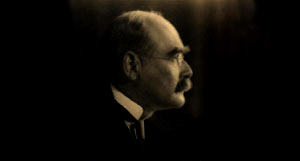| |
|
- T h e A u t h o r
- Rudyard Kipling, (1865-1936), English poet, novelist and short-story writer, remembered for his celebration of British imperialism in India and Burma, was born in 1865, in Bombay, where his father was teacher at a school of art. His mother was a sister-in-law of the painter Edward Burne-Jones. In 1871, he was taken to England by his parents and left for five years at Southsea. The boy's unhappiness was alleviated by visits to his uncle Burne-Jones. He returned to India in 1882, where he worked as a journalist and a short-story writer in Lahore. In 1892 he married Caroline Balestier, and they spent the years 1892-96 near her family in Vermont, USA. In 1897 the family moved back to England, and settled in Burwash, Sussex. In 1907 he became the first English writer to receive the Nobel Prize for Literature. In1936, Kipling died in London, and was buried in Poet's Corner at Westminster Abbey.


- T h e W o r k
- Departmental Ditties (1886)
Plain Tales From the Hills (1888)
The Phantom Rickshaw (1888)
Wee Willie Winkie (1888)
The Light That Failed (1890)
Life's Handicap (1891)
The Naulakha(1892)
Soldiers Three (1892)
Barrack-Room Ballads and Other Verses (1892)
Many Inventions (1893)
The Jungle Book (1894)
The Second Jungle Book (1895)
The Seven Seas (1896)
Captains Courageous(1897)
Stalky & Co (1899)
Kim (1901)
Just So Stories (1902)
Traffics and Discoveries (1904)
Puck of Pook's Hill (1906)
Actions and Reactions (1909)
Rewards and Fairies (1910)
A Diversity of Creatures (1917)
The Irish Guards In The Great War (1923)
Debits and Credits (1926)
Limits and Renewals (1932)
Something Of Myself (autobiography, posth. 1937)
Poetry
Letters
- A p p e n d i x
- Sources/Colophon
|
|